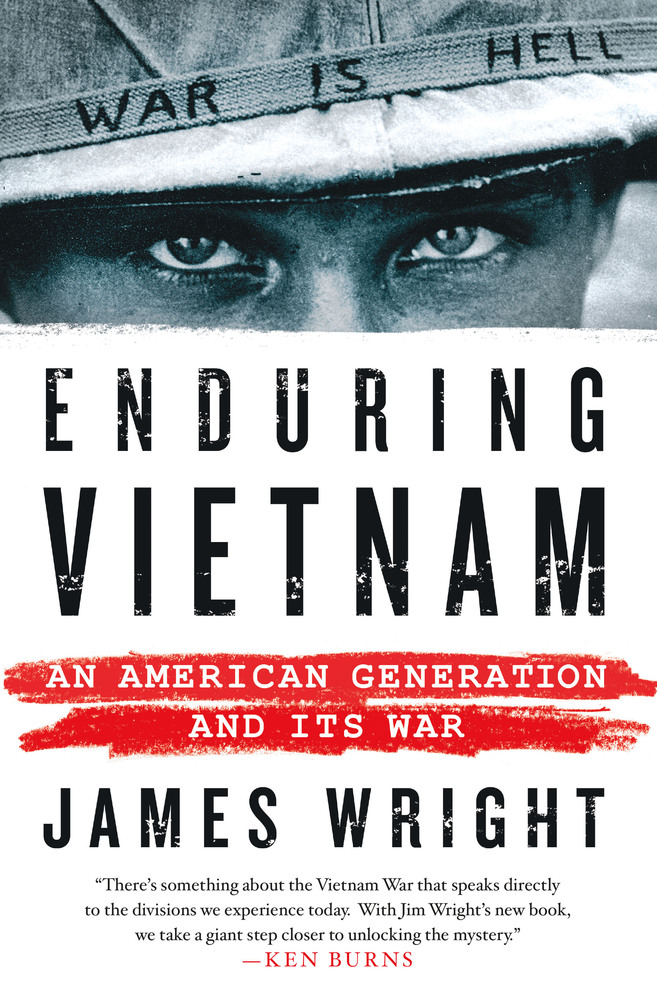Ironically, Vietnam, an intimidating experience of smells, explosions, and death, a place that was the focus of much of the world’s attention, was also reduced to a very personal and constrained existence for those who were there. If back in the States it was a big-screen moral and political saga, in-country, especially for those out in the field, it was a very focused view of a very existential world: “You’re not thinking about the war and whether it’s right or wrong, or whether it’s moral or not, or the right thing to be or even the smart thing to do,” said one soldier. “You’re thinking more about your own hide and your own position in life and the fact that you’re going to a war zone. So your world becomes smaller in a way. You think less geopolitically than you do in terms of your own day-to-day life.”
The striking thing about the accounts and the memories of the men who were out in combat zones at this time is how little attention they paid to the debate and the announcement of fundamental political decisions back home. One soldier who had been opposed to the war before he went into the Army said that in Vietnam the soldiers didn’t really talk that much about the politics. “We didn’t sit around at night saying, ‘Oh, what a lousy war.’ Even though we knew as much about what was going on as anybody, we really didn’t have much of the anger that has been described by others in 1969.” Another young soldier said that most of the men he was with didn’t do a lot of complaining about the war. One man, who had been antiwar before he was drafted and continued to hold that view in Vietnam, said that he and his company commander were the only ones who cast absentee votes in the 1968 presidential election (though he acknowledged that most of the men in his company were not yet old enough to vote). An Army chaplain noted that “their drive was to get out of there, ‘do our job and get outta here.’ ”
An antiwar college dropout who was drafted and volunteered for the Rangers—and heavy combat duty—faced field operations with “a certain inevitability, a certain fatalism, a certain pessimism—but it was very personal. It really wasn’t political at all.” He acknowledged not thinking about the politics but knowing that the confrontations were “going to be hell and we may not survive it. So it was much more a personal level than a political level.” Years later he reflected on his tour in Vietnam by considering “the sheer irrationality of it all—not to the point of being surreal but in many ways that me and my fellow soldiers, our sole motivation was to survive and get home.”
Another Marine wasn’t sure what to think about the protesters: “I think even after being in Vietnam, I really had no good perspective on what the hell was going on over there. I was in survival mode for thirteen months when I was in-country.” One twenty-year-old draftee from the Bay Area was a gunner on a helicopter. He too had encountered a lot of antiwar protests back home, but he didn’t think about this activity when he was in Vietnam. His mother sent him an article from the San Francisco paper saying that “the Hell’s Angels want to come to Vietnam and they were going to end the war in a couple weeks. I told my mom, ‘Go ahead and send them.’ ” And a Marine from Indiana said that the protesters should “come over here and bat the bullets down with their signs and see what happens.”
Sustaining morale in this environment with young troops was always a challenge. As one young soldier said, “We were disgruntled when we were humping, tired, sleepy, hungry, hot, cold, sick, and wet or when things do not go right for us. Overall combat is miserable and nerve racking. We did not discuss much about politics because we were young and did not know much about the issues or platforms of certain parties.”
A soldier who served there in the summer of 1969 described it succinctly: “This is hell. Besides killing and maybe being killed there are many other things that make life almost unbearable. Leeches that suck our blood, insects of all kinds, snakes, spiders.…The heat, the rain and mud. The long marches with heavy pack, going two or three weeks without a bath, wearing the same clothes for weeks at a time, not having a place to sit down or even lie down except in six inches of mud.” (Longley, Grunts)
An infantryman who served in the Mekong Delta wrote, “The hot weather, mud, and constant wetness from sweeping filthy rice paddies are reducing my stamina. I am tormented daily by the native pests, including mosquitoes, rats, red ants, and leeches. The mosquitoes are terrible. At night the repellant lasts less than twenty minutes before the pests fly in your ears, nose, and mouth.…My body is covered with infections from cuts incurred in the field. They won’t heal because I’m in water each day for hours at a time. The bottoms of my feet are full of small holes, and I develop a mild case of immersion foot. The ringworm around my waist and ankles is unmanageable because my belt and boots remain wet most of the day. I get very little rest and sometimes suffer from battle fatigue when I deal with booby traps, firefights, suicide missions, and the trauma associated with friends getting wounded or killed.” (Milliken, Enter and Die)
They all understood…[their] task, and this understanding and this task were basically reduced to survival—survival of self and of comrades in the field. There had never been marching bands. Now there were no pledges of “victory.” New York Times reporter B. Drummond Ayres explained that “the farther out in the field that you got, the tougher the fighting got but the more people hang together and hung together just because everybody knew that you were fighting to stay alive, not necessarily just to kill as many Viet Cong and NVA as you could.” He observed an attitude of, “Yeah, people back home really don’t like it and I don’t like it either but, you know, I’m here.…I wish I didn’t have this to put up with, but we’re in it together so we have to hang together or we’re all going to die together.”
Excerpted from Enduring Vietnam by James Wright. Copyright (c) 2017 by the author and reprinted by permission of Thomas Dunne Books, an imprint of St. Martin’s Press.


